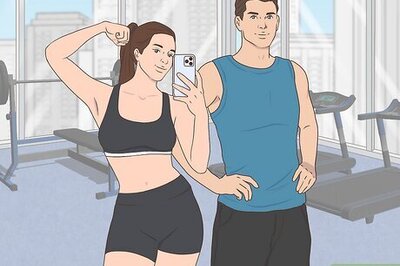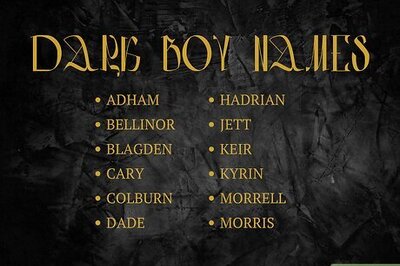
views
San Francisco: When four Republicans and five Democrats got together at a high-end condominium complex to talk for seven hours in San Francisco this fall, it was such a curiosity that a crowd of more than a dozen gathered just to watch.
Where had they found these Trump supporters in the first place, some wondered.
Why would anyone subject themselves to a day of this, others asked.
And if the day’s experiment worked — defined loosely as everyone surviving and maybe also not yelling? — were there any lessons to be drawn for less controlled environments like the Thanksgiving table or a Tinder date?
The host was a nonprofit called Better Angels, which is putting on a half-dozen events around the country every week through the election.
Its work is part of a boomlet in efforts to break partisan passion in the U.S. as the 2020 election approaches.
There’s TruStory, a new social network that uses points-based incentives to encourage good debate. Bridge the Divide brings young people together to engage in “respectful, face-to-face” conversations. Make America Dinner Again helps people host cross-party dinner parties. Companies hire Georgetown business school professor Christine Porath to come in as a civility consultant. And there’s Civility, a physical meetup group that is now becoming a virtual platform for finding understanding between those on opposite sides of the political divide.
Or rather, of the cultural divide. Because the division is no longer just about politics. Politics is the backdrop, of course. The House is moving forward with impeachment proceedings — an effort that Republicans insist is a “Soviet style” “coup” and that President Donald Trump warned, quoting a pastor on Twitter, would “cause a Civil War like fracture.”
“I had not been, shall we say, enthusiastic about the divisiveness that would occur from an impeachment,” House Speaker Nancy Pelosi said about why she had been wary of the proceedings.
But even Americans outside the Beltway have been conscripted into this war, sometimes without realizing it. Many going to these civility gatherings talked about new family divisions and fights among friends. Cross-party relationships that had survived the Bush or Obama presidencies were faltering now under Trump.
Last month, Ellen DeGeneres sat next to former President George W. Bush at a football game and later called him a friend. It turned into a national storm that made it to the Democratic debate stage in October with a question from Anderson Cooper about whether any of the candidates had “surprising friends.”
Facebook’s chief executive, Mark Zuckerberg — under scrutiny for his company’s policy on not fact-checking political advertisements — was also criticized recently for meeting with conservative journalists and commentators. The hashtag #deletefacebook trended in response. Zuckerberg responded to the outcry.
“Meeting new people and hearing from a wide range of viewpoints is part of learning,” he wrote. “If you haven’t tried it, I suggest you do!”
At Better Angels, the polarized were at a square table supervised by two moderators, a therapist and a retired psychiatrist. They were mostly in their 50s and 60s and wore red and blue name tags to correspond with their political leanings. The moderators referred to them as the reds and the blues.
The day began with each group devising a list of the biggest stereotypes they think others have about them.
Ruth Ashkenazi, 51, of the reds, raised her hand and said: “Racist.”
Carlos Hernandez, 62, added, “White.”
Hellynn Reilly said, “White supremacist.”
The moderator tried to lump all these together. A few could surely just fit under the stereotype category of racist, no? No.
“White, privileged and also anti-immigrant,” Reilly said.
The blues came back from their session. The top stereotype they listed was godless/decadent. Each side presented their lists.
The conservatives were surprised the liberals thought at all about religion. The liberals were surprised the conservatives were so anxious about being seen as racist.
Over a lunch break of deli sandwiches and mixed bean salad, the two groups stayed largely separate.
Many of the blue side said they came just for the opportunity to meet and question someone who disagreed with them politically.
“Outside of this group, I’ve got no Republican friends,” said Monty Worth, 52, a teacher who had also been to one previous session. “My grandparents were, but they died.”
People on the red side said they came to the workshop to be in a safe space where they could be open about their politics and argue their case.
Ashkenazi lives in Cupertino, considers herself socially liberal but fiscally conservative, voted for Trump and teaches fitness classes. She learned to avoid talking about her politics when, the morning after the 2016 election, a friend stormed out of her class.
“A good friend of mine came to boot camp and starting railing against those ‘stupid racist’ Midwesterners, and I said, ‘Let’s just work out,’ and she was like, ‘How could you defend them?’” Ashkenazi said. “And that’s when I realized conversations would need to be very carefully crafted and choreographed from there on out.”
At one point, each side went to separate rooms to workshop questions for the other. Leslie Lopato, who was moderating for the blue side, directed them to come up with open, nonjudgmental questions.
Martha Keller, a lawyer who volunteers with progressive groups, started:
“Do you regret voting for Donald Trump knowing now how he acts not only personally but knowing how he is treating his powers and duties as a president?”
“So that’s kind of a gotcha,” Lopato said.
“I want to know why these people voted for him,” Keller said.
Denise Giacomini went next. She said some of the people she’d met on the red side “seemed reasonable.” But she had some questions for them.
“How are they able to get past Trump’s outrageous behavior. How can they block it out? How?” And: “What I want to ask is, what exactly are the positives to Trump?”
The moderator again tried to adjust the question.
“But just so you understand, they will be able to give you a list of positives,” Lopato said. “Is that what you’re wanting?”
Better Angels has its headquarters in a couple of small rooms in a midtown Manhattan office building. The man who started it is David Blankenhorn, who rose to national prominence as a vocal and influential opponent of same-sex marriage in the mid-2000s before publicly reversing himself.
He had spent years touring the country, talking about the sanctity of marriage and the risk to the institution that same-sex marriage posed.
“Everywhere I went, gay people would come up to me after my talk, and they would say, ‘I’d like to show you a picture of my children,’ and for the longest time, it bothered me, and I would be, like, ‘Look, wonderful kid,’ but I sort of felt like saying, ‘What? Would you like to see pictures of mine?’” Blankenhorn said.
His reversal on same-sex marriage did not come from new statistics or arguments but from something much simpler: He became close friends with a gay man.
“I realized that what they really were trying to do was just make a human connection,” Blankenhorn said. “They weren’t out to ruin America.”
Now a supporter of the thing he had fought, Blankenhorn wound down his nonprofit and sold his condominium to stay afloat financially.
After the 2016 election, he and two friends got together and led the first Better Angels workshop in Ohio. Now more than 15,000 people have gone through one of their programs (8,000 have joined as dues-paying members), and the group has trained more than 620 volunteer workshop moderators (a lot of whom were therapists) to continue the mission in dozens of towns.
One challenge among many is figuring out how to describe what they are doing.
“Dialogue, that’s a liberal word,” Blankenhorn said. “What conservatives want to do is discuss or debate issues.”
“Liberals want to sit in a circle and share,” he said. “Conservatives do not want to sit in a circle, and they do not want to share.”
So he and his colleagues are careful to hold Better Angel events at rectangular tables. And moderators are instructed to avoid words like share.
Common language is getting hard to come by as common ground gives way. Democrats and Republicans are more ideologically different from what they previously were and like each other less than they used to, according to a 2014 Pew survey.
“There isn’t now even agreement anymore on whether civility is a good thing,” said James Calvin Davis, a Middlebury College professor and author of “In Defense of Civility.”
Civility is engaging in respectful dialogue with people with whom you vehemently disagree, but the term has become loaded, Davis said.
It now implies docility or weakness. The word itself is a sort of insult.
“The left has become not only impatient with civility but suspicious of civility,” Davis said. “And the right — incivility is being endorsed on the highest level.”
Max Marty, a lanky 35-year-old, leads Civility, a San Francisco startup. Previously, he was head of business development for the Seasteading Institute, an effort to create autonomous cities in international waters. It did not work out. Now he just wants people to sit at a table (or a video chat) and talk.
One recent evening the conversation concerned the white nationalist movement. The white supremacist site The Daily Stormer was assigned reading.
In the Civility mindset, an idea might be offensive, but if enough people have that idea, then it deserves a fair hearing — and a seat — at the table.
“Instead of just hating on it, saying ‘Oh, I can’t stand it, so horrible, blah, blah, blah,’ it’s about really putting yourself in that mindset to be able to understand it more deeply,” Marty said, “and then be able to have a rational, civil discussion on it.”
Most of these civility efforts are bipartisan, and groups like Better Angels guarantee that every workshop will have an equal split between Republican and Democratic attendees. Events have taken place in every state. But most of their programs are in liberal cities. Marty is in San Francisco, TruStory is based in Los Angeles, Better Angels in New York.
In Rockville, Maryland, about 30 people gathered for a Better Angels workshop one recent Saturday. They went around the room introducing themselves.
“I don’t know that many conservatives, and, should I ever encounter one, I’d like to know how to handle it,” one woman said.
Sara Kuhn, 31, is moving from the predominantly liberal Rockville to a smaller, more conservative town in southwest Virginia, and she wanted help learning how to talk to people there.
“Yeah, you’re going to need it,” someone nearby said, sympathetically.
Elle Karpman, a 68-year-old conservative retiree in Silver Spring, Maryland, came to the workshop because her daughter, who she described as liberal, asked her to.
“She said, ‘Mom, go to this workshop and learn these skills so you know the error of your ways,’” Karpman said. “Can you believe that? The error of my ways!”
Karpman, like many of the conservatives in attendance, said she feels unfairly labeled racist. She left the workshop early.
The moderator, Jan Rybeck, coached the group on how to make someone’s perspective — in this case, on the migrant crisis at the border — more comprehensible.
“Breathe into your belly. Find your feet on the ground. And ask them to tell you more,” she said.
Reflecting on her experience a few weeks later, Keller, the Bay Area lawyer who attended the San Francisco workshop, said she did not feel much closer to the other side.
“I saw all the red people smiling” while leaving the event, Keller said. “They felt validated and accepted. I think that was the object the whole time. And I thought, ‘Who are these people?’”
Nellie Bowles c.2019 The New York Times Company


















Comments
0 comment